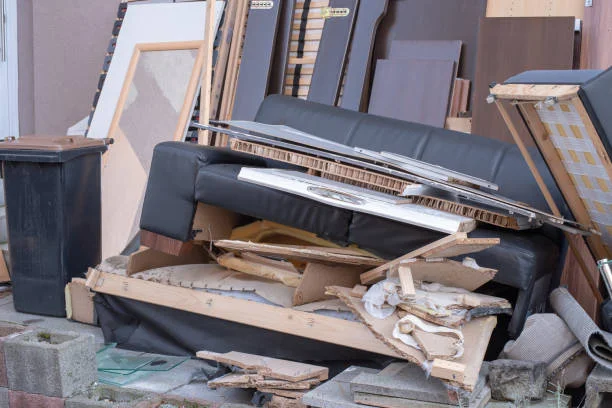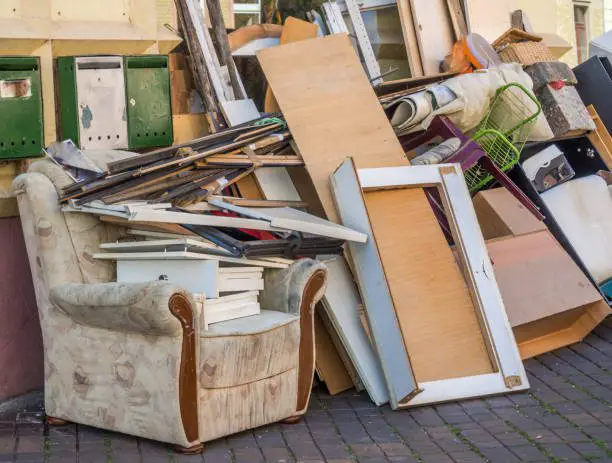Large objects that are too huge to be disposed of in a conventional garbage receptacle are referred to as bulky wastes. Construction garbage, appliances, and furniture are a few examples of bulky wastes.
To safeguard the environment and make sure that these goods are disposed of safely and responsibly, the management of bulky garbage is crucial.
Garbage that is too big to fit in regular trash cans and collection systems is referred to as bulky waste. It may be challenging to handle because to its size and weight since it contains things like furniture, appliances, and tires.
If it is not properly controlled, it may become an eyesore, a pain in the neck, and a danger to one’s safety. A system for gathering and disposing of bulky garbage must be in place in order to manage it properly.
This may include initiatives that let citizens dispose of large amounts of rubbish at designated drop-off points or via specialized collection services. For the treatment and processing of bulky garbage, it could also be essential to make investments in specialist machinery and infrastructure.
The quantity of garbage that is dumped in landfills may be decreased with proper management of bulky wastes, which can also assist to keep communities safe and clean.
Proper Bulky Wastes Management Methods

(1) One-way pickup
Many municipal governments and trash management firms provide curbside collection as a service to enable citizens to get rid of bulky, heavy, or difficult-to-transport goods including furniture, appliances, and construction supplies.
Residents may just leave these goods at the curb on a predetermined day, and a truck will come by to collect them, saving them the trouble of having to transfer them to a landfill or recycling facility.
Given that it requires less energy and resources to transport the garbage, this method of disposal may be both practical and ecologically beneficial. For this service, some jurisdictions may demand a fee, while others might provide it without charge.
Read Also: Biomedical Wastes Complete Management Guide
You may need to get in touch with your local government or trash management firm to learn more about participating in a curbside collection program for bulky wastes and to arrange a pickup.
Bulky rubbish may be picked up at the curb in a lot of cities and municipalities. On a certain day, you may place your belongings at the curb for trash management to pick up.
(2) Drop-off locations
Waste that is too big to be put in a regular trash bin is referred to as bulk rubbish, huge household objects, or bulk waste.
These things might be furniture, appliances, big toys, or other bulky home goods. Some towns provide drop-off locations where citizens may bring their large amounts of rubbish to be appropriately disposed of.
Residents may transport their large amounts of rubbish to authorized drop-off locations in certain cities and municipalities. The municipal government or private businesses with a government contract may run these facilities.
You may check with your local government or trash management business to see whether your municipality offers a drop-off location for large amounts of rubbish. Information regarding where to dispose of bulky rubbish in your area may also be found online.
Depending on the municipality, bulky garbage may be picked up on certain days or by appointment only. It’s a good idea to check with your local government or trash management business to find out the regulations in your region since there may be costs involved with the disposal of bulky garbage.
(3) Individual haulers
Private haulers are businesses or people that charge a fee for their garbage collection and disposal services. They could provide services for bulky garbage, which includes bulkier objects that might be difficult to get rid of using standard rubbish collection services.
Construction debris, furniture, and appliances are examples of bulky garbage. You may arrange a collection and removal service with a private hauler if you need to get rid of large amounts of rubbish.
By doing a web search or browsing through local directories, you may be able to identify private haulers in your region. It is crucial to remember that prices for private hauler services might vary, so be sure to seek estimates from many businesses before choosing. Bulky garbage may also be picked up and disposed of by private businesses for a charge.
Read Also: Types and Consequences of Translocation
(4) Donating or selling
This might give your products a new life and lessen trash. Bulky trash goods, including furniture or appliances, have a few choices for donation or sale. Here are some suggestions:
• Make a charitable donation: Many organizations, like the Salvation Army and Goodwill, accept contributions of gently used furniture and appliances. For bigger things, you may often arrange a pickup.
• Sell online: You may sell your large things on a variety of websites and applications, including Craigslist and Facebook Marketplace. It’s possible to locate a person who will come take up the item from your house.
• Hold a garage sale: You can think about holding a garage sale if you have a lot of stuff to sell. This may be a practical method for getting rid of several things at once.
• Recycle: Some electronics and appliances may be recycled. To find out whether they do, inquire with your local government or a recycling facility.
• Engage a garbage removal service: You may hire a rubbish removal service to remove your large goods if you don’t want to deal with the inconvenience of selling or donating them.
Usually, they will get rid of the things in an eco-friendly manner. Instead of disposing of bulky garbage in a landfill, there are various advantages to doing so:
i. Environmental conservation: reduction of greenhouse gas emissions, and pollution reduction are all aided by diverting garbage from landfills.
ii. Economically speaking: giving or selling stuff may save disposal costs and perhaps even make some money.
iii. Social: Giving goods to charities or selling them to those in need may have a beneficial social effect by lowering waste and aiding those in need of resources.
iv. Personal: Decluttering the house and feeling accomplished and satisfied may both be achieved by selling or donating goods that are no longer required.
In general, bulky garbage has to be disposed of appropriately in order to be handled in an ecologically friendly manner.
Read Also: 4 Ways of Caring for a Fruit Tree for High Production

